- Home
- Sam Siciliano
The Grimswell Curse Page 14
The Grimswell Curse Read online
Page 14
Rose gave her head a shake. “It seems a desecration. These things must have had a religious significance. I can feel it.”
Holmes shrugged. “I fear men have little regard for the beliefs of their predecessors. No doubt someday our great cathedrals will be picked through by latter-day vultures the way we have picked through the tombs of the pharaohs and the temples of the Greeks.”
She licked her lips, stared up at the menhir, then turned away abruptly.
“Is anything the matter?” I asked.
“No.” Her smile was tenuous. “I do not like menhirs. Even as a child they somehow frightened me. They seem so old and so cold. They make one think how short life is. How many who stared at that rock are dead and gone, mere bones and dust? Even as we someday...”
Holmes eyed her closely, his lips curving upward. “A melancholy reflection for a young lady of twenty.”
Her dark eyebrows came together. “I cannot help what I feel. We Grimswells are a melancholy lot. Perhaps that is the true nature of the curse.”
“You misunderstand me—I meant no censure in my observation. I too frequently fall prey to such reflections. Of course, I am twice your age.”
Her eyes hardened, then her mouth relaxed into a smile. “Tell me, Mr. Holmes, at the age of twenty were you a cheerful young man who never thought of death, evil or other dark matters? Was life all sweetness and light for you at that age?”
Holmes smiled, and I could not repress a laugh. “Very good, Miss Grimswell,” he said. “Your instincts again serve you well. My disposition has changed very little. Perhaps the renaissance physicians were correct in their theory of humors. Perhaps you and I share an abundance of black bile, a secretion which causes melancholy.”
I shook my head. “The theory of humors is nonsense. Black bile as such does not exist.”
“Perhaps not,” Holmes said, “but melancholy does, and it appears to run in families. Tell me, Miss Grimswell, did your studies include the ancient Egyptians, Greeks and Romans?”
They had, she told us, and if we had any doubts, it soon became even more apparent that she was a well-educated and intelligent young lady. She seemed familiar with the major discoveries in Egypt of our century. How she would be wasted on a man like Digby! But then I remembered Holmes telling me Digby was not the imbecile he pretended to be. All the same, he certainly did not seem right for this sensitive young woman. I found her quite charming, and so, I could tell, did my cousin.
After an hour’s walk, we circled round and came upon Merriweather Farm. The dwelling was very old, probably a century or two, the walls formed of black granite stones, the weathered gray shale roof equally somber. Unlike Grimswell Hall it had no park, only a massive ancient oak with bronze leaves and two dark scraggly pines. Such dwellings were often home to man and beast, the cattle residing in half the house during the winter months, but the place seemed deserted, neither man nor animals present, save two rooks in the pines who cawed hoarsely with dismay at our approach.
“Did you say the farm had an occupant?” Holmes asked.
Miss Grimswell’s dark brows came together. “I was told it did, yet it appears deserted.”
A moment later the door opened, and a person stepped forth, a woman in a black dress, her pale yellow hair bound up, so light in the sun that I briefly thought it white, mistaking the young woman for her grandmother. She raised a hand in our direction. “Good day!”
“Good day,” Holmes replied loudly. More quietly to Miss Grimswell: “That must be the tenant, a widow I believe you said. Do you know her?”
“We have never met.”
The widow advanced slowly in our direction. “It is a fine day for a walk. Have you traveled far?”
A worn stone path wound toward the house; we followed it to meet her. “Not far,” Holmes said. “We have been walking the moors. We came from Grimswell Hall.”
“Ah, we are neighbors then. I am Mrs. Grace Neal, and you...?”
“My name is Sherlock Holmes. This is my cousin, Doctor Henry Vernier.”
I was watching her and saw no sign of recognition of Holmes’s name; clearly she was not one of Doctor Watson’s readers. Her skin was pale with a rosy tint, her eyes blue, and she was a very attractive woman, her features and her tiny hand quite delicate. Her widow’s weeds were black, but the dress was fine silk, the cut elegant and quite contemporary, sleeves puffing out at the shoulder, then tapering at the elbows. An elaborate floral pattern showed, a black-on-black design, and her impossibly small waist must be the result of a corset cinched far too tight. My physician’s instinct and my marriage to Michelle made me cringe at such abuse of the internal organs by whalebone and steel.
“And this is Miss Rose Grimswell,” Holmes continued.
Her smile wavered as she stared up at Rose, who was a good foot taller than she. “You are Miss Grimswell, Lord Grimswell’s daughter?”
“Yes.”
“It is a pleasure to meet you. I knew your father—not well, of course, not well at all, but... enough to recognize him as a gentleman. I’ve missed seeing him walking about the moors. He was a familiar sight. We have few visitors to this part of Dartmoor, and it was reassuring to see him and know there was a man of character and breeding close by.”
Rose smiled sadly. “Thank you.”
Holmes’s eyes were shaded by the brim of his hat, but they peered closely at Mrs. Neal. “This seems a desolate and lonely spot for a woman such as yourself, Mrs. Neal.”
“What do you mean by that, sir?”
“Only that a woman of your class is seldom found living a solitary life in the wilds of Dartmoor, and you are obviously not a native.”
“How do you know that?”
“By your manner of speaking. You are from London.”
A flush showed on her cheeks, but she smiled. “I am. My late husband and I lived there.”
“Indeed? And how did you come to dwell at Merriweather Farm?”
“My husband and I took a walking tour shortly after we were married, and we both fell in love with Dartmoor. After he died, I... The bustle and squalor of London became too much. I fled here to be alone with my thoughts, hoping that these great vistas, the lonely majestic moors and the bleak tors, might in time comfort a heart equally desolate.”
Her voice had a faint quaver at the end. Holmes raised one eyebrow and gave her a curious look. His mouth twitched, but he did not speak. Miss Grimswell’s brow was furrowed, her eyes faintly uneasy.
I shook my head. “Such a course of action is unwise. Isolation and lack of activity are not likely to assuage your grief, but rather to prolong it. Solitude is not good for one accustomed to the companionship of marriage.” She stared at me, and I felt embarrassed at my zeal. “Forgive me, but as a physician, I must often advise those who have lost a loved one.”
“It might not suit everyone, doctor, but I am content here.”
Rose stared at her, her dark brows coming together where her frown created a furrow over her nose. “What on earth do you do all day?”
Mrs. Neal laughed. “Ah, it does get tedious at times, but I have my needlework and my devotional books.”
Holmes scratched at a stone before him with the end of his stick. “I assume you have a servant to do the cooking, the cleaning and assist you in dressing.” His eyes swept over her figure in the elegant black dress as he spoke.
“I do, a young girl from Grimpen. However, I fear I may not count on her help for long.” Her smile faded, and she stared past us at the moor.
“Why not?” I asked.
She gave a nervous laugh. “The villagers are unwilling to come here, especially at night. My Nell... Something frightened her, and her father told her he wouldn’t have her spending the night here any longer. He has one of her brothers bring her in the morning and pick her up in the evening. With the days getting shorter and shorter, and winter coming... Soon I shall be alone.”
I frowned. “This is not wise.”
She shrugged. “I’m not
afraid.”
Holmes raised his eyes. “Does your servant fear a man in black?”
Mrs. Neal’s tiny mouth parted. “How could you know that?”
“One need not be in the vicinity long to hear various tales. And has she spoken of wolves or dogs as well?”
“She has! The man was watching her from atop a tor, an enormous hound beside him. Probably only another solitary soul like... My dear, are you quite well?”
Miss Grimswell had gone pale, and her eyes briefly lost focus.
“Oh no,” I said, seizing her arm.
She drew in her breath, nostrils flaring. “I am... It is nothing. Only some faintness.”
“Would you like to come in and sit down?”
“No—no—I would rather keep walking.”
“Let us do so, then.” I turned her about and started down the path. Holmes was on the other side, ready to seize her arm.
“Oh, I am sorry. You must come back again for a real visit. Perhaps you could stop by for tea? Perhaps tomorrow, even?”
“Oh yes,” Rose murmured.
“We shall see,” Holmes said. “I would like to speak with you again. You said you knew Lord Grimswell?”
“Oh, not well, Mr. Holmes. Not well at all.”
“It has been a pleasure, madam. Until we meet again.”
He removed his hat, the sun shining on the pale dome of his long forehead. Miss Grimswell stared resolutely ahead, but her eyes seemed to go in and out of focus. Soon I released her arm. She took a deep breath and smiled at me. “Thank you, doctor. I... I really am not usually one of those damsels who is always fainting.”
“You do not appear to be.”
“I only... I have had too many... surprises of late.”
“You have indeed.”
Within a few minutes she had recovered, and she and Holmes began to discuss the Neolithic settlements and the early dwellers of Dartmoor. We had almost reached the hall when we heard the groan of wagon wheels. Behind us were the morose man from the village and, in the back of the dog cart, Lord Frederick. “I say—Rose!” he shouted, waving a yellow-gloved hand. He wore a gray top hat and frock coat, apparel more appropriate for Hyde Park than Dartmoor.
Rose raised her hand. Her cheeks were pink, but her smile had become a forced, feeble thing. Her blue-gray eyes briefly gazed off across the moors, as if she were seeking somewhere to escape. Digby leaped down from the cart, then gave her a proprietorial embrace. She stood stiffly, her eyes gazing briefly at Holmes and me. She appeared embarrassed.
“How I’ve missed you! I hope you’ve come to your senses.” He looked at Holmes and me. “She has come to her senses, hasn’t she?”
Digby kept up a steady banter while the rest of us said little. Our silence did not concern him in the least. We separated in the house, Rose giving us a brief, desperate glance before Holmes and I went upstairs.
“Poor girl,” I murmured.
Holmes pulled off his gloves and stuffed them into his hat. “Henry, would you care to have a look at the tower?”
“Which tower?”
“That of Grimswell Hall, of course—Lord Grimswell’s aerie.”
“Oh. Do you know the way?”
“Yes. Fitzwilliams told me earlier.”
I left my own hat and gloves in my room, then we went down to the gallery, through a doorway at the end, then started up a winding stone staircase. Small windows let shafts of yellow light cut through the dim interior. My cousin’s breath grew labored. I felt a curious tightness in the chest, and my hands were suddenly cold. It was not from exertion.
“Sherlock, perhaps... I think I may turn back.”
“But we are almost there. Do you not...?” He turned and saw my face. “Forgive me, Henry, I had forgotten. And perhaps I thought that after our adventures in Paris, you would have conquered your vertigo.”
“It has not been so severe, yet I am remembering now that... Memory has little to do with it—my body will go its own way.”
“The tower is enclosed, so it will not be too bad. And look—we are nearly there.” An opening showed in a stone ceiling above us, and we climbed through and entered a circular room a good twenty feet across.
The wall was the usual black granite, but the room was ablaze with light from the huge windows. The walls were positively medieval, but the windows were modern, sheets of clear plate glass three feet wide and six feet tall. A circular carpet covered the floor, an exotic one of many colors with an elaborate pattern, a kaleidoscope with repeating circles which brought to mind alchemy or sorcery. The stone floor formed a black circle round the carpet. A cast-iron stove sat on one side of the room, and near it a large brass telescope. The only furniture was a massive oak table, two matching chairs and a larger leather chair and ottoman. A wooden ladder leaned against the wall, and above you could see the trap door leading to the roof or attic.
“Incredible,” Holmes murmured. He strode to a window. “Henry, you must see this. Surely with the stone walls and the glass...”
I walked slowly toward the window, staying well back. A distant river formed a ribbon of light winding through the dark moor.
Holmes wiped at his forehead with his hand, then took off his heavy tweed jacket and set it on the table. “It is quite warm in here. I wonder...” Beneath the window was an iron crank; he took it, pushed one way, then turned it the other. With a slight pop the window opened, the huge expanse of glass in its iron frame swinging outward an inch or so on one side. The muted sound of the wind filled the room along with the cool air. Holmes turned the crank until the window had swung open a foot.
The air felt good, but I realized one could slip through that opening and plunge to certain death below. “I had rather you didn’t open it any further.”
“Very well, Henry.” Holmes leaned on the casement and stared out. “These windows must be extremely heavy, yet the mechanism is very well built. I thought this tower must be idle folly, but now... What a marvelous retreat. It provides solitude, and views at every window which take one’s breath away. I would I had such a tower. Most rich men build little more than monuments to their own bad taste, great dreary creations, but this is different.”
“A bit Faustian,” I said.
“Ah.” He nodded. “I can see him sitting at his table there peering over great tomes, seeking the elixir of life, or there at his telescope exploring the mysteries of the universe. And of course Mephistopheles would have appeared in a cloud of smoke in the very center of that carpet.”
Holmes went to the telescope and touched its gleaming four-foot bronze length with his fingers. The tripod of reddish cherry wood was very solid-looking. “This is a beautiful instrument, a four-inch refractor, for viewing the moon and planets. The skies of Dartmoor are frequently overcast, but on a clear night so far from the city and its ambient light, viewing would be ideal. Jupiter is in the sky now. We must have a look some evening, Henry. And yet...” He stepped back, then bent over and peered into the eyepiece at a right angle to the tube, adjusting the focusing knob with his hand.
He stood and turned to me, a weary smile pulling at his lips. “Perhaps I have misjudged Lord Grimswell.”
“What do you mean?”
“The telescope is not pointed at the heavens, is it? Have a look.”
“I...”
“Come, Henry, the window is closed, and you need not come too close.”
I approached warily, then leaned over. The circle danced about, went black and then lighter again. The image was faint and blurry, insubstantial, but I was staring at a black wall and a window set in the wall, a square of glass, a cross of lead dividing it into four panes. “What on earth?”
I raised my head and tried to see where the scope was pointed. In the distance, across the moor and far below, was a rectangular black dwelling with a huge oak nearby. It took a second or two for me to realize what I was seeing.
“Merriweather Farm,” I murmured.
“Yes,” Holmes said. “Merriweather Farm.�
��
Eight
The locksmith from Grimpen arrived late in the afternoon. He and Holmes spoke of levers and tumblers, Chubb locks, detectors, metal alloys—all of it gibberish to me, but when the man left an hour later, a shiny new circle of metal had appeared above the doorknob in the oaken door to Rose’s room. Holmes gave Rose one key, kept one for himself, and sternly told her she must always lock the door whenever coming or going. He suggested she always leave the key in the same spot near the door whenever she was in her room. He also insisted that the maid again spend the night with her.
I had not slept well the prior night, and the hike on the moor, being far more activity than I was accustomed to, had left me yawning prodigiously by nine in the evening. Holmes, however, was prepared to remain awake for a long while—I knew it from a certain look in his eyes. He had removed one of the viscount’s precious pipes and had just lit it when I prepared to retire. Even I could tell the tobacco was far better than his usual noxious shag.
He exhaled a cloud of the fragrant smoke. “Do you think the viscount’s vengeful ghost, this wraith or vampire, will fall upon me for borrowing his pipe?”
I shrugged. “I do not find such speculation amusing.”
The ironic smile still pulled at his lips. “Do not fear, Henry. I know that a man who loved pipes and tobacco as much as the viscount must have would not begrudge another their use. He would not want them buried with him as if he were some ancient potentate.”
“Are you not tired?”
“Not terribly. I have several things to consider, and I wish to periodically check on Miss Grimswell.” His smile suddenly faltered. “I hope... Should there be a reoccurrence of her somnambulism, I may need to wake you.”
I thought the anticipation of being dragged from my bed in the middle of the night might keep Morpheus at bay, but I slept very soundly and rose later than usual. Holmes’s door was closed, which did not surprise me. As I went downstairs into the great hall, the insipid laugh of Lord Frederick rose to greet my ears. He was below with Rose, and when she saw me, her upturned face showed relief.

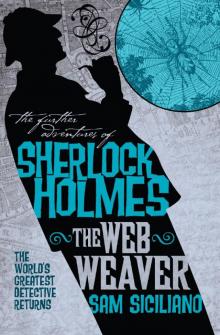 The Web Weaver
The Web Weaver The Further Adventures of Sherlock Holmes--The Devil and the Four
The Further Adventures of Sherlock Holmes--The Devil and the Four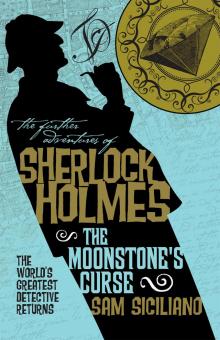 The Moonstone's Curse
The Moonstone's Curse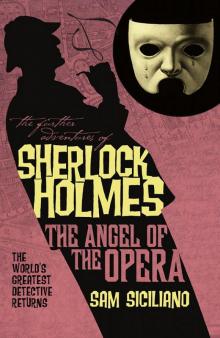 The Angel of the Opera
The Angel of the Opera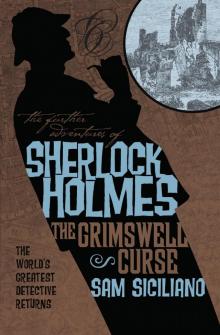 The Grimswell Curse
The Grimswell Curse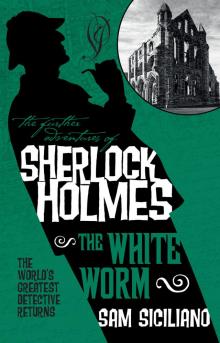 The White Worm
The White Worm